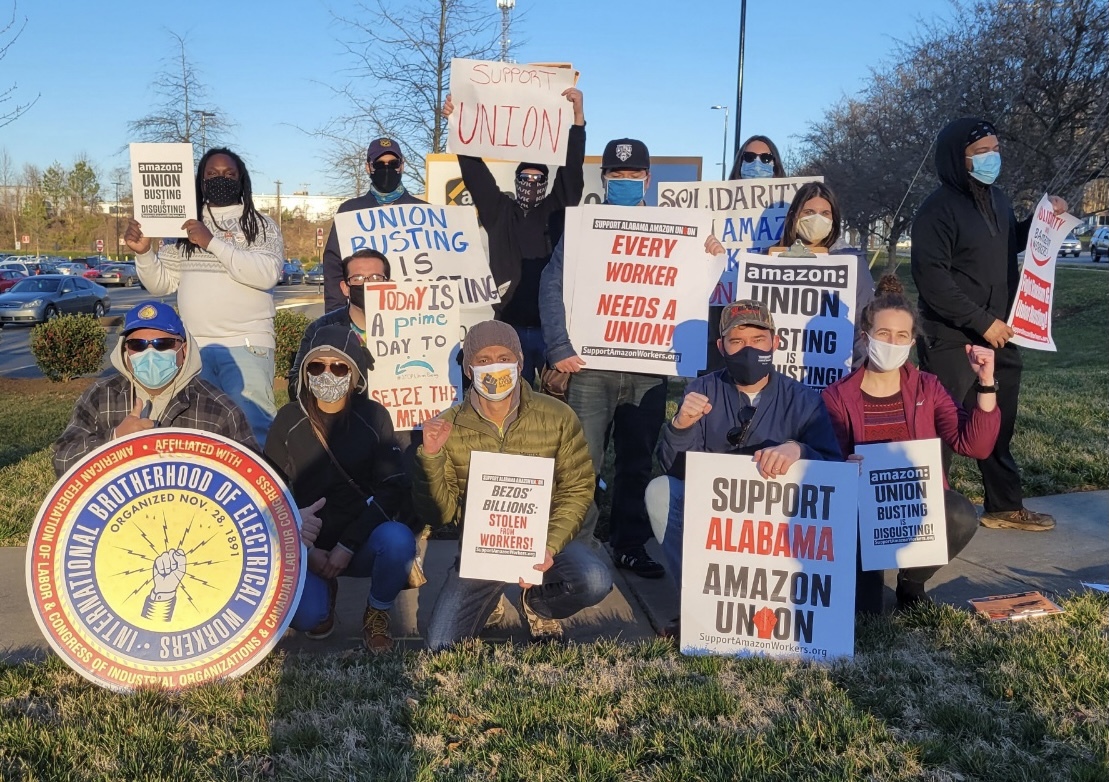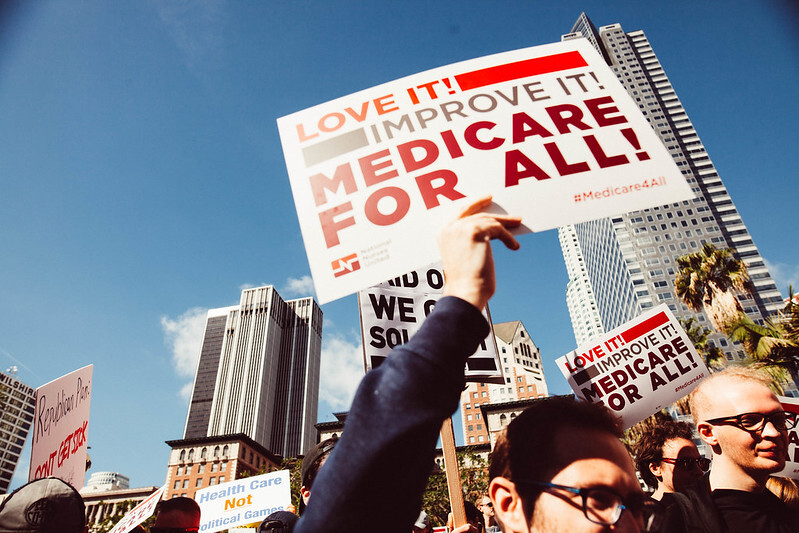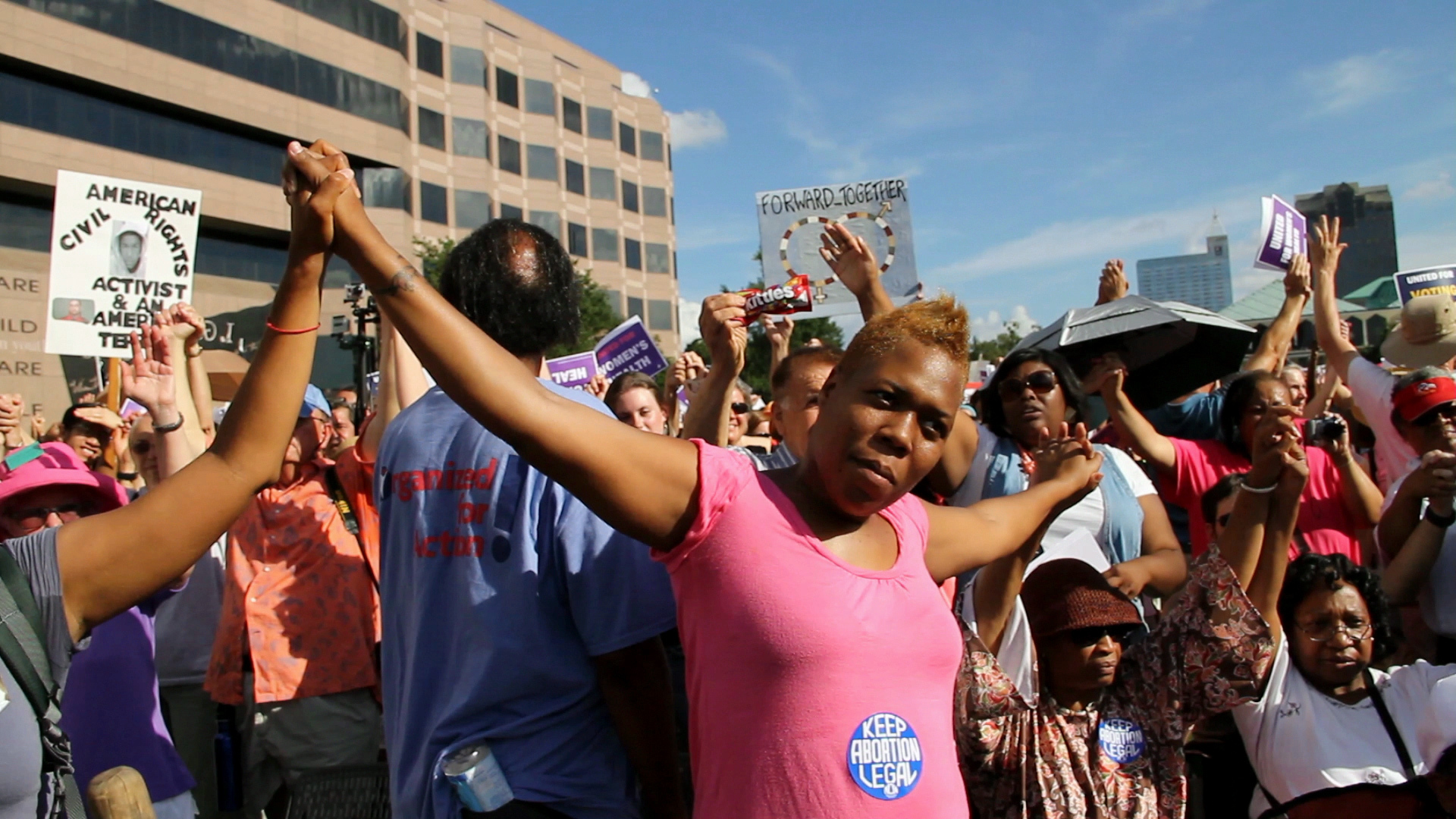Episodes

Tuesday May 18, 2021
Episode 7: Labor After Bessemer with Saladin Muhammad
Tuesday May 18, 2021
Tuesday May 18, 2021

The labor movement in the South was dealt a heavy blow in April when workers at an Amazon fulfillment center in Bessemer, Alabama, voted roughly 2 to 1 against unionizing with the Retail, Wholesale, and Department Store Union (RWDSU).
The loss came on the heels of other recent unsuccessful attempts to unionize Volkswagen and Nissan plants in Tennessee and Mississippi. But the stakes seemed higher in Bessemer.
Leading the labor campaign at the Alabama warehouse were Black workers who risked losing their jobs to speak out against one of the world’s most powerful and fastest-growing corporations in the least unionized region in the country.
To be clear, the RWDSU made plenty of miscalculations that contributed to the Bessemer blowout. However, the union struggle at the Amazon fulfillment center was never going to be a fair fight.
While Amazon publicly extolled the value of Black lives, the corporation unleashed a ruthless and well-financed anti-union campaign upon its majority Black workers in the leadup to the election. The company barraged workers with disinformation and lies about the union.
Meanwhile, union avoidance experts charging Amazon thousands of dollars per day held captive audience meetings in an effort to turn workers against the union. Amazon even tried to turn the entire Bessemer community against the union by threatening to withdraw the fulfillment center--a major source of jobs and revenue--out of the area.
In this week's episode, host Jonathan Michels speaks with Saladin Muhammad to dissect about the Bessemer union drive and the importance of social movement unionism in the effort to organize rank-and-file workers in the South, and workers of color in particular. Muhammad is a retired international rep for the United Electrical Workers union and a founding member of both Black Workers for Justice and the Southern Workers Assembly. He lives in North Carolina.
For a transcription of this episode, click here.
Show notes:

Monday Apr 12, 2021
Episode 6: Lights, Camera, Hillbilly! with Meredith McCarroll
Monday Apr 12, 2021
Monday Apr 12, 2021

What images spring up in your mind when you think about popular representations of people living in Appalachia? Is it a bearded man in a coon-skin cap? A toothless old granny? Young children running barefoot in homemade clothes?
The truth is that Appalachia is as diverse in race, class and thought as the rest of the nation but rather than take the time to tell more complicated and nuanced stories, the media frequently fall back on stereotypes.
The most recent example, but by no means the last, is director Ron Howard’s new film, Hillbilly Elegy, which was released by Netflix in 2020.
The film is based on the bestselling memoir by J.D. Vance. Like the book, the movie follows Vance’s struggle to rise above impoverishment and drug addiction in southwestern Ohio to become a Yale law graduate and later, a high-powered venture capitalist.
Critics blasted the film as being little more than a “shameless piece of Oscar bait.”
Nevertheless, the strategy worked. The Academy of Motion Picture Arts and Sciences recently honored Glenn Close with an Oscar nomination for her portrayal of Vance’s Mamaw. The fact that Howard’s film garnered so much buzz and attention, even if most of it is negative, is a testament to the power of media.
In this week's episode, host Jonathan Michels speaks with Meredith McCarroll about Hillbilly Elegy and why media literacy is so important if we hope to recognize the ways that Hollywood and publishers perpetuate stereotypes of Appalachian life in the media.
McCarroll was born and raised in the Appalachian mountains of Western North Carolina. She currently teaches writing and rhetoric at Bowdoin College and is the author of several books including Un-White: Appalachia, Race, and Film and Appalachian Reckoning, an edited collection of essays written in response to Hillbilly Elegy.
For a transcription of this episode, please click here.
Further reading:
- Unwhite: Appalachia, Race, and Film by Meredith McCarroll
- “J.D. Vance, the False Prophet of Blue America” 2016 article by Sarah Jones about how J.D. Vance became one of the media’s favorite explainers of the Trump phenomenon
- “Parler Wanted Donald Trump On Its Site. Trump’s Company Wanted A Stake.”
- Appalshop
- Appalachian Media Institute

Friday Nov 13, 2020
Episode 5: The Southern Struggle Over Medicare for All with Rita Valenti
Friday Nov 13, 2020
Friday Nov 13, 2020

The federal response to the deadly coronavirus pandemic under President Trump has been a public health disaster with more than 230,000 Americans dead and no clear end in sight.
In sharp contrast, President-elect Joe Biden has pledged to mount a serious response against the coronavirus. Biden recently announced a panel of health care experts to begin to counter a surge of COVID-19 hospitalizations throughout the country.
On the matter of health reform, however, the president-elect has offered measures that would merely bolster and even expand the same private health insurance system that has prompted physicians and other frontline healthcare workers to feel like they are fighting COVID-19 with one hand tied behind their backs.
Biden ran on returning the country to normalcy but there was nothing normal about the American healthcare system before the pandemic. The truth is our dysfunctional medical system remains an outlier among the rest of the so-called developed world.
The United States produces some of the worst health outcomes in the industrialized world and devours an ever-increasing share of our economy with health spending accounting for an astounding 17.9 percent of the GDP with nothing to show for it. As many as 250,000 Americans die each year from medical errors. That’s more than the amount of people who have died from COVID-19.
Is that the kind of return to normalcy that Americans want, need or deserve?
The answer, of course, is no.
Poll after poll has shown that Americans want a universal, single-payer healthcare system that is focused on meeting human needs and not the needs of investors.
Medical care under a single-payer system, usually referred to as Medicare for All, would be universal, meaning everyone in the United States, including undocumented immigrants, would have equal access to treatment; it would be free at the point of care since there would be no premiums and no cost-sharing; and unlike our current Medicare program for seniors, vision, dental and long-term-care services would be covered, too.
There are few parts of the country that would benefit from Medicare for All more than the South.
The coronavirus pandemic has provided us with an opportunity to make sweeping changes to our social welfare system like Medicare for All but they are destined to fail without the support of people living in the South.
Private health insurers, pharmaceutical companies and banks, which have ensnared millions of Americans indebted by medical expenses, stand to lose too much if America moves to a single-payer system. They have and will continue to fight tooth-and-nail to keep the money flowing for as long as they can.
In this week's episode, host Jonathan Michels speaks with Rita Valenti to talk about the ways that the South is particularly unprepared to withstand the coronavirus pandemic and how Southerners can and must be at the forefront of the Medicare-for-All movement. For the last 40 years, Valenti has been on the front lines of the fight for health equity as a nurse and as a fierce advocate for single payer as a board member of Healthcare—NOW!.
For a transcription of this episode, please click here.
Further reading:
- “Southern Workers Unite Around Medicare for All: ‘A Tremendous Liberation From Your Boss’” article about a worker-led campaign to mobilize Southerners around Medicare for All
- Southern Workers Medicare for All Campaign
- “Immigrants allege mistreatment by Georgia doctor and whistleblower” investigative report about the Georgian doctor accused of forcibly sterilizing immigrant women at the Irwin Detention Center
- “Masks, Gowns, and Medicare For All” article about how Medicare for All would benefit frontline healthcare workers

Tuesday Oct 13, 2020
Episode 4: Snowden, Surveillance and the South with Joseph Atkins
Tuesday Oct 13, 2020
Tuesday Oct 13, 2020

In June 2013, Edward Snowden handed over to journalists thousands of classified documents about a secret dragnet surveillance program with the capability of spying on everyone in America. Among the Snowden revelations was a program code-named PRISM, which collects data directly from the country’s largest telecommunications servers, including Google, Facebook, Microsoft and Apple.
The intelligence community’s blatant disregard for Americans’ civil liberties under the United States Constitution prompted Snowden to go public. For Snowden, leaking such highly classified secrets was likely the last act he would commit as a free man.
The Obama administration quickly condemned the leaks and charged Snowden under the 1917 Espionage Act. Some officials called Snowden a traitor and a Chinese spy while others lauded him for his public service.
Seven years later, Snowden remains in exile in Russia under a constant fear of extradition and legal retribution.
There are signs, however, that Snowden might soon be able to return to the United States without the threat of retaliation. In September, the ninth circuit court of appeals ruled that the NSA’s surveillance program violated the Foreign Intelligence Surveillance Act and was likely unconstitutional. Soon after, President Trump signalled that he might be willing to pardon Snowden.
Snowden hails from the South. He was born in Elizabeth City, North Carolina.
Whether he knows it or not, Snowden is part of a long history of Southerners who have stood up to state-sponsored surveillance in the region.
One of the most nefarious surveillance operations was the Mississippi Sovereignty Commission, which was designed explicitly to stymie Mississippi’s burgeoning civil rights movement. The commission worked in the shadows collecting information about homegrown dissidents and so-called outside agitators that could then be used to blackmail them or plant disinformation in the press.
One person likened the commission to a “magnolia gestapo.”
In this week's episode, host Jonathan Michels speaks with Joseph Atkins about the effort to pardon Edward Snowden and how the history of surveillance in the American South set the model for NSA spying today. Atkins teaches journalism at The University of Mississippi and writes about workers’ struggles at Labor South.
For a transcription of this episode, please click here.
Show notes:
- “Mississippi Set Model for NSA Spying” article by Joseph Atkins connecting Snowden’s revelations with the Mississippi police state of the 1960s
- Mississippi Sovereignty Commission online archives
- “The Fire This Time” Intercept article about how police surveillance of anti-racist activists continues today in Memphis, Tennessee
- The Joe Rogan Experience featuring Edward Snowden
-
Independent Media Roundtable: Julian Assange’s Extradition Trial And The War On Journalism featuring Kevin Gosztola from Shadowoproof

Tuesday Sep 22, 2020
Tuesday Sep 22, 2020

The South is poised to once again play a pivotal role in this year’s presidential election.
From the end of the Civil War right up until today, North Carolina has served as a battleground state between the majority of people that at various points have pushed for transformational change and a powerful minority bent on perpetuating divisions along racial, gender and class lines through state-sanctioned and vigilante violence or exclusion dressed up as political moderation.
Despite being lauded as a leader of the progressive, so-called New South, North Carolina led the way in constructing Jim Crow segregation following Reconstruction, resisted the integration of public schools after the Supreme Court’s 1954 decision striking down separate but equal and boasted more Ku Klux Klan members at the height of the Civil Rights Movement during the 1960s than all the other Southern states combined.
More recently, following the Republican takeover of the state legislature in 2010, special interest groups like the American Legislative Exchange Council targetted the Tar Heel state to serve as a laboratory for new and increasingly sophisticated ways of using policy to preserve power in the hands of the few through gerrymandering and by restricting people, primarily people of color, from exercising their right to vote.
Unfortunately, the Southern predicament has become the scourge of the nation. Variations of the voter suppression tactics used in North Carolina have been deployed throughout the country and they have been on full display during the coronavirus pandemic. Formerly incarcerated people in Florida were recently denied access to the ballot box because of outstanding fines. The closure of polling sites in Milwaukee during the April primary election forced Black and Latinx people to wait in long lines to vote at grave risk to their health. On the national level, recent cuts to the United States Postal Service could play a major role in the outcome of the 2020 presidential election when an estimated 80 million Americans are expected to vote by mail.
In this week's episode, host Jonathan Michels talks with Robert Korstad and James Leloudis to examine these recent attacks on our democracy through the lens of the long struggle for voting rights in North Carolina. Korstad is a professor emeritus of public policy at Duke University and Leloudis is a professor of history at UNC-Chapel Hill. They just wrote a new book called Fragile Democracy: The Struggle Over Race and Voting Rights in North Carolina.
For a transcription of this episode, please click here.
Show notes:
- Fragile Democracy digital exhibit
- “State for Sale” New Yorker article about how conservative multimillionaire Art Pope helped turn North Carolina into a laboratory for implementing right-wing policies, including voter suppression measures
- “It’s Monday and the South is Rising” short documentary about the Moral Monday movement

Friday Sep 04, 2020
Friday Sep 04, 2020
 On the 75th anniversary of the atomic bombing of Hiroshima, we explore how the United States is engaged in a new and potentially cataclysmic nuclear arms race. Despite the tremendous financial, environmental and human costs, this new nuclear arms race has largely gone unnoticed by the public.
On the 75th anniversary of the atomic bombing of Hiroshima, we explore how the United States is engaged in a new and potentially cataclysmic nuclear arms race. Despite the tremendous financial, environmental and human costs, this new nuclear arms race has largely gone unnoticed by the public.
Since the nuclear arms race of the 1980s, members of the Plowshares movement have engaged in a bold acts of civil disobedience in an effort to break through the malaise and to protest the United States’ preparations for omnicide—the death of everything.
On April 4, 2018, seven Plowshares activists infiltrated the Kings Bay Naval Base in St. Mary’s, Georgia, the largest nuclear submarine base in the world, containing six Trident submarines, each capable of holding 200 nuclear warheads.
Some of the peace activists strung up crime scene tape and hung protest banners that read “The Ultimate Logic of Trident is Omnicide.” Others symbolically disarmed the deadly arsenal by pouring their own blood around the base and using hammers to beat full-scale replicas of the Trident missiles, a reference to a verse in the book of Isaiah that calls on nations to “beat swords into plowshares."
In this week's episode, host Jonathan Michels talks with one of the members of the Kings Bay Plowshares Seven, Patrick O'Neill, about the Plowshares action and its impact on the movement to abolish nuclear weapons. O’Neill is a longtime peace and anti-racist activist and a co-founder of the Fr. Charlie Mulholland Catholic Worker House in Garner, North Carolina.
For a transcription of this episode, please click here.
Show notes:
- Kings Bay Plowshares 7 website for more information about the action and the trial
- “The New Nuclear Threat” by Jessica T. Matthews
- “The Pope and Catholic Radicals Come Together Against Nuclear Weapons” by Paul Elie

Tuesday Aug 18, 2020
Episode 1: Organizing to Defend "Paper and People" with Tonia Moxley
Tuesday Aug 18, 2020
Tuesday Aug 18, 2020
This episode explores the wave of labor organizing overtaking newsrooms across the country even amidst the coronavirus pandemic. In April, The Roanoke Times in Virginia became the latest newspaper in the South to form a labor union when workers voted 47 to 3 to join The Newspaper Guild-Communications Workers of America.
Shortly after The Roanoke Times unionized, the paper’s parent company, Lee Enterprises, announced plans to eliminate the copy desk and move the design department out to the Midwest later this fall. The decision would result in the elimination of 10 workers. That’s one-fifth of the newsroom.
In this week's episode, host Jonathan Michels talks with reporter Tonia Moxley about the union campaign at The Roanoke Times and its implications for media workers throughout the South and the future of local news reporting. Moxley is a 20-year veteran reporter at The Roanoke Times and the chair of the Timesland News Guild.
For a transcription of this episode, please click here.
Show notes:
- “Copy Desk Defense” campaign to save the jobs of 10 workers at The Roanoke Times.
- “News Deserts and Ghost Newspapers: Will Local News Survive?” report from the UNC Hussman School of Journalism and Media.
- “Do You Live in a News Desert?” interactive graphic
- “Why Newsrooms Are Unionizing Now” report about the proliferation of journalism unions

